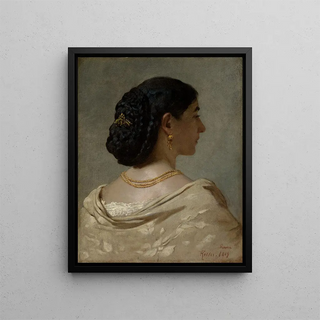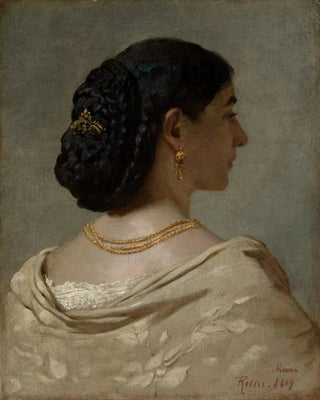Painting Portrait of Nana Risi - Ferdinand Keller | Art print


View from behind

Frame (optional)
The "Portrait of Nana Risi" by Ferdinand Keller is a piece that transcends the simple frame of painting to become a true window into the human soul. This artwork, imbued with rare delicacy, invites the viewer to immerse themselves in the intimacy of a fascinating female figure. Through plays of light and subtly coordinated shades of color, Keller succeeds in capturing not only the appearance of his model but also an essence, a palpable emotion that seems to vibrate beyond the canvas. This portrait, a true ode to beauty and the complexity of feelings, bears witness to the artist's exceptional talent and his skill in establishing a dialogue between art and the viewer.
Style and uniqueness of the work
Ferdinand Keller's style stands out for its unique approach to representation. In the "Portrait of Nana Risi," one perceives a remarkable mastery of light, which sculpts the facial features with striking precision. The colors, delicately chosen, oscillate between warm tones and soft shadows, creating an atmosphere that is both intimate and melancholic. Nana Risi's posture, slightly tilted, suggests vulnerability that draws the eye and the mind. Every detail, from the reflection in her eyes to the texture of her skin, is carefully crafted, demonstrating meticulous attention to human detail. This portrait does not merely depict a person; it tells a story, that of a woman, her dreams, her struggles, and her intrinsic beauty.
The artist and his influence
Ferdinand Keller, an emblematic figure of the 19th century, managed to establish himself in the artistic landscape of his time thanks to his innovative approach and unique sensitivity. Influenced by the great masters of the past, he reinterpreted the codes of classical painting while infusing it with a modernity that is his own. His work is marked by an incessant quest for emotional truth, a desire to capture not only appearance but also the soul of his subjects. Through the "Portrait of Nana Risi," Keller demonstrates his ability to establish a deep connection with his model, making each canvas a meeting space between the

Matte finish

View from behind

Frame (optional)
The "Portrait of Nana Risi" by Ferdinand Keller is a piece that transcends the simple frame of painting to become a true window into the human soul. This artwork, imbued with rare delicacy, invites the viewer to immerse themselves in the intimacy of a fascinating female figure. Through plays of light and subtly coordinated shades of color, Keller succeeds in capturing not only the appearance of his model but also an essence, a palpable emotion that seems to vibrate beyond the canvas. This portrait, a true ode to beauty and the complexity of feelings, bears witness to the artist's exceptional talent and his skill in establishing a dialogue between art and the viewer.
Style and uniqueness of the work
Ferdinand Keller's style stands out for its unique approach to representation. In the "Portrait of Nana Risi," one perceives a remarkable mastery of light, which sculpts the facial features with striking precision. The colors, delicately chosen, oscillate between warm tones and soft shadows, creating an atmosphere that is both intimate and melancholic. Nana Risi's posture, slightly tilted, suggests vulnerability that draws the eye and the mind. Every detail, from the reflection in her eyes to the texture of her skin, is carefully crafted, demonstrating meticulous attention to human detail. This portrait does not merely depict a person; it tells a story, that of a woman, her dreams, her struggles, and her intrinsic beauty.
The artist and his influence
Ferdinand Keller, an emblematic figure of the 19th century, managed to establish himself in the artistic landscape of his time thanks to his innovative approach and unique sensitivity. Influenced by the great masters of the past, he reinterpreted the codes of classical painting while infusing it with a modernity that is his own. His work is marked by an incessant quest for emotional truth, a desire to capture not only appearance but also the soul of his subjects. Through the "Portrait of Nana Risi," Keller demonstrates his ability to establish a deep connection with his model, making each canvas a meeting space between the
12,34 €






